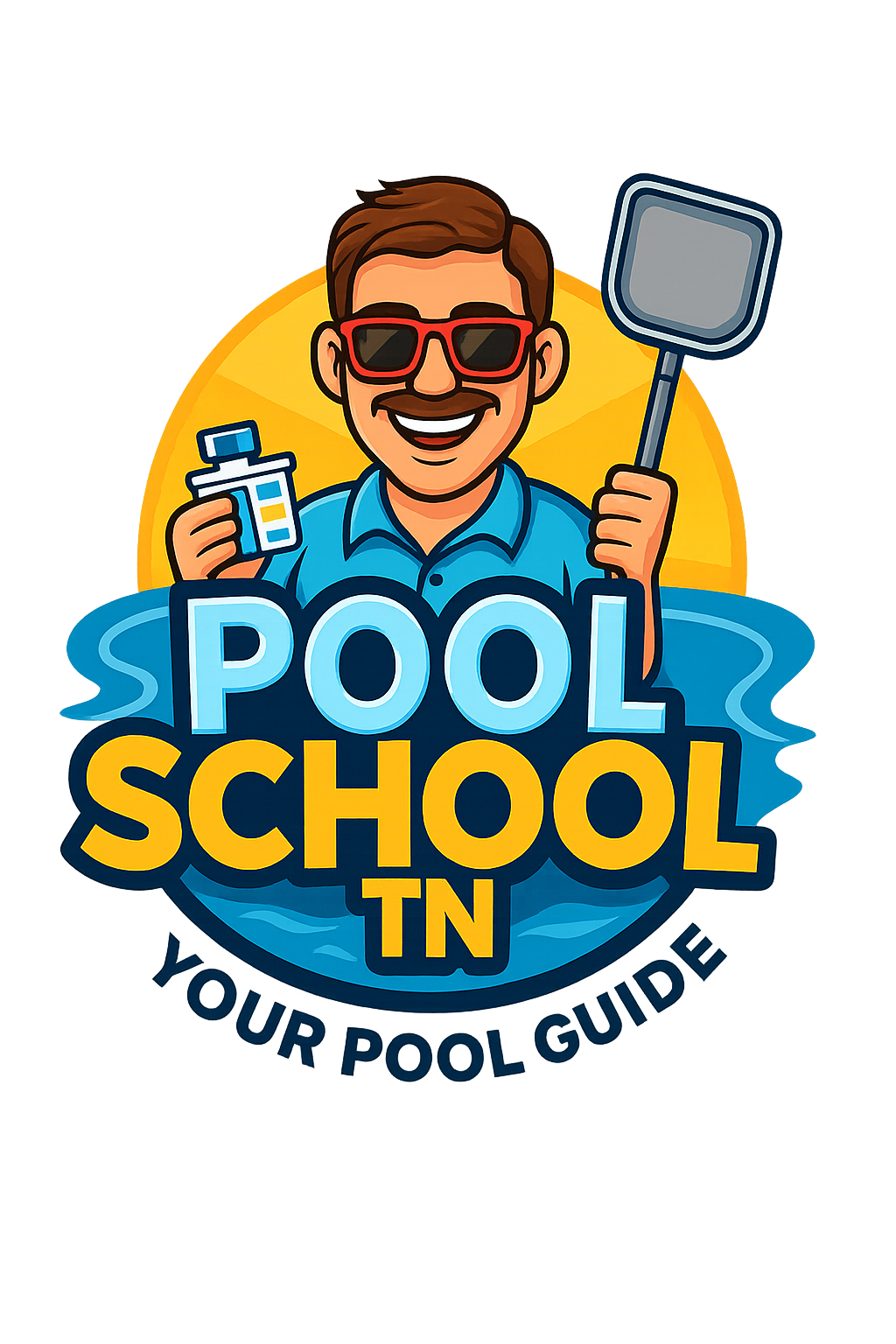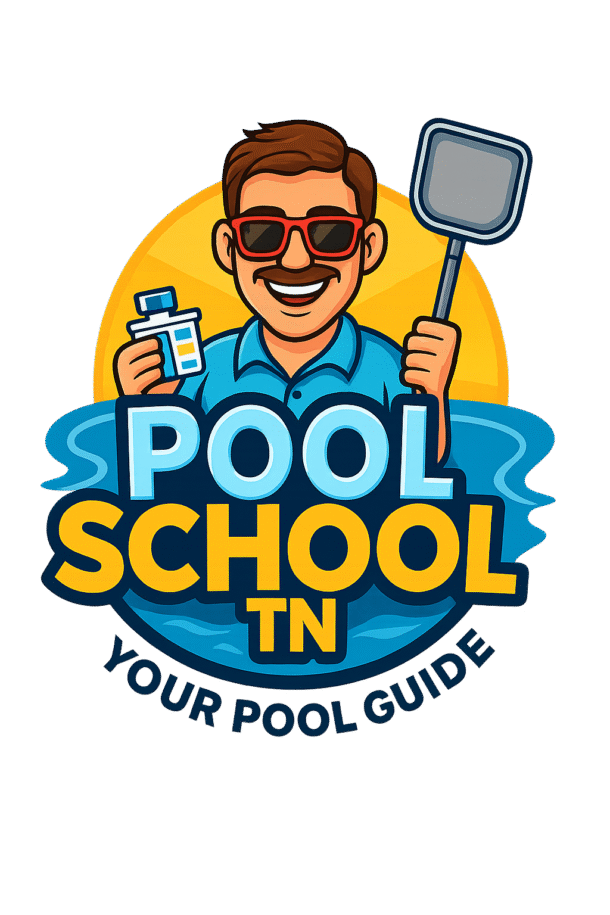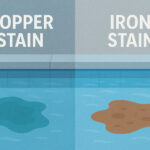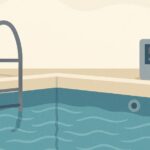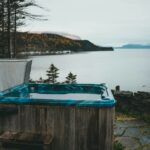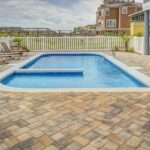Pool Equipment Guide: Essential Gear Every Tennessee Pool Owner Needs
Whether you’re a new pool owner trying to figure out what equipment you actually need, or a seasoned Tennessee pool veteran looking to upgrade your setup, this comprehensive guide will walk you through every piece of essential pool equipment. We’ll cover what’s absolutely necessary, what’s nice to have, and what’s specifically important for Tennessee’s unique climate challenges.
🔧 Equipment Reality Check: “You don’t need every piece of pool equipment on the market, but you absolutely need the right equipment for Tennessee’s heat, humidity, and unpredictable weather.”
Understanding Pool Equipment Categories
The Big Three: Non-Negotiable Equipment
These are the pieces of equipment your pool literally cannot function without. Every pool must have these basics to maintain safe, clean water.
Climate Enhancers: Tennessee-Specific Additions
Equipment that becomes essential due to our hot summers, high humidity, and extended swimming season.
Convenience Upgrades: Nice-to-Have Equipment
Equipment that makes pool maintenance easier but isn’t absolutely necessary for basic operation.
Advanced Systems: Premium Options
High-end equipment for pool owners who want automated, effortless pool care.
💡 Tennessee Tip: “Our 90°F summers and 70%+ humidity make certain ‘optional’ equipment practically essential. Don’t learn this the hard way.”
The Big Three: Essential Pool Equipment
1. Pool Pump – Your Pool’s Heart
What it does: Circulates water through your filtration system, ensuring chemicals distribute evenly and debris gets filtered out.
Tennessee Considerations:
- Must handle increased circulation demands during hot weather
- Should run longer hours (8-12 daily) during peak summer
- Energy efficiency matters with extended season operation
Types and Recommendations:
Single-Speed Pumps (Basic Option):
- Cost: Budget-friendly option
- Best for: Budget-conscious owners, smaller pools
- Tennessee reality: Higher electricity costs during extended season
- Lifespan: 6-10 years with proper maintenance
Variable-Speed Pumps (Recommended):
- Cost: Higher upfront investment
- Best for: Energy savings, larger pools, year-round operation
- Tennessee advantage: 40-70% lower electricity costs
- Lifespan: 10-15 years, quieter operation
- ROI: Pays for itself in 2-3 years through energy savings
Sizing Guide:
- Pools up to 15,000 gallons: 1 HP pump adequate
- Pools 15,000-25,000 gallons: 1.5 HP recommended
- Pools over 25,000 gallons: 2+ HP necessary
- Tennessee multiplier: Consider upgrading one size due to extended season
2. Pool Filter – Your Water Purifier
What it does: Removes debris, dirt, and contaminants that chemicals can’t eliminate. The quality of your filtration directly affects water clarity and chemical effectiveness.
Filter Types Comparison:
Sand Filters (Most Common):
- Cost: Budget-friendly option
- Maintenance: Backwash weekly, sand replacement every 3-5 years
- Best for: Basic filtration, low maintenance preference
- Tennessee performance: Good for most applications, struggles with fine debris during heavy pollen season
Cartridge Filters (Middle Ground):
- Cost: Moderate initial cost (plus ongoing cartridge costs)
- Maintenance: Clean/rotate cartridges every 2-4 weeks
- Best for: Better filtration than sand, no backwashing
- Tennessee performance: Excellent for pollen and fine debris common in our area
- Ongoing cost: Moderate annual cartridge replacement costs
DE (Diatomaceous Earth) Filters (Premium):
- Cost: Higher upfront investment
- Maintenance: DE powder addition, annual grid cleaning
- Best for: Crystal-clear water, fine particle removal
- Tennessee performance: Excellent but requires more expertise
- Ongoing cost: Low annual costs for DE powder
Tennessee Recommendation: Cartridge filters offer the best balance of performance and convenience for our climate conditions.
3. Pool Heater – Extended Season Essential
Why it’s essential in Tennessee: While not technically required, a heater extends your swimming season from 4-5 months to 7-8 months, dramatically increasing your pool’s value and enjoyment.
Heater Types:
Gas Heaters (Most Popular):
- Cost: Moderate to high upfront investment
- Fuel: Natural gas or propane
- Best for: Quick heating, on-demand use
- Tennessee advantage: Heat pool quickly for unexpected cool spells
- Operating cost: Moderate daily costs during heating season
Electric Heat Pumps (Most Efficient):
- Cost: Higher upfront investment
- Best for: Consistent heating, environmental efficiency
- Tennessee performance: Excellent in our moderate climate
- Operating cost: Lower daily costs, 60-80% more efficient than gas
- Limitation: Less effective when air temperature drops below 50°F
Solar Heaters (Eco-Friendly):
- Cost: Moderate to high initial investment
- Best for: Environmentally conscious owners, sunny locations
- Tennessee potential: Good solar exposure, but weather dependency
- Operating cost: Minimal after installation
- Limitation: Weather-dependent, slower heating
🌡️ Tennessee Heat Strategy: “A heat pump can extend your season until November, while gas heating handles those surprise 60°F September days perfectly.”
Climate Enhancers: Tennessee-Specific Equipment
Pool Cover System – Combat Evaporation and Debris
Why Tennessee pools need covers:
- High evaporation rates during hot, windy weather
- Heavy tree coverage creates constant debris
- Extends heating efficiency significantly
Cover Types:
Solar Covers (Budget Option):
- Cost: Most affordable cover option
- Benefits: Reduce evaporation, retain heat, prevent debris
- Tennessee performance: Can raise water temperature 8-15°F
- Lifespan: 2-3 years with UV exposure
- Best for: Budget-conscious owners, seasonal use
Automatic Pool Covers (Premium):
- Cost: Significant investment
- Benefits: Convenience, safety, maximum efficiency
- Tennessee value: Pays for itself through reduced chemical and heating costs
- Lifespan: 7-12 years with proper maintenance
- Best for: Frequent pool users, safety-conscious families
Safety Covers (Winter/Off-Season):
- Cost: Moderate investment
- Benefits: Safety compliance, debris protection, equipment protection
- Best for: Tennessee’s unpredictable fall/winter weather
Automatic Pool Cleaner – Handle Heavy Debris Load
Tennessee Challenge: Our abundant tree coverage and frequent storms create constant cleaning demands that manual cleaning can’t keep up with.
Cleaner Types:
Suction-Side Cleaners (Budget):
- Cost: Most affordable automatic cleaning option
- Power source: Uses existing pump suction
- Best for: Basic debris removal, budget-conscious owners
- Tennessee performance: Good for leaves and large debris
- Popular models: Kreepy Krauly, Hayward Navigator
Pressure-Side Cleaners (Mid-Range):
- Cost: Moderate investment
- Power source: Dedicated return line or booster pump
- Best for: Heavy debris loads, thorough cleaning
- Tennessee performance: Excellent for our leaf and pollen challenges
- Popular models: Polaris 280, Pentair Racer
Robotic Cleaners (Premium):
- Cost: Higher investment with premium features
- Power source: Independent electric motor
- Best for: Complete automation, superior cleaning
- Tennessee performance: Handles everything our climate throws at it
- Energy efficient: Uses less electricity than pressure cleaners
Pool Automation System – Handle Complex Tennessee Weather
Why automation matters in Tennessee:
- Rapid weather changes require quick chemical adjustments
- Extended season means more equipment management
- Humidity and temperature swings need constant monitoring
Basic Automation (Budget-Friendly):
- Timer controls for pump and lighting
- Basic chemical feeders
- Simple temperature control
Advanced Automation (Premium Investment):
- Smartphone app control
- Weather integration
- Automatic chemical balancing
- Equipment diagnostics and alerts
📱 Tech Advantage: “Automation systems can adjust your pool chemistry based on Tennessee weather forecasts, preventing problems before they start.”
Convenience Upgrades: Nice-to-Have Equipment
Pool Lighting Systems
LED Pool Lights:
- Cost: Moderate investment per light
- Benefits: Energy efficiency, color options, long lifespan
- Tennessee value: Extends evening swimming during cooler weather
Landscape Lighting:
- Cost: Moderate to high investment for complete system
- Benefits: Safety, ambiance, property value
- Best for: Year-round pool area enjoyment
Water Features and Accessories
Pool Fountains/Waterfalls:
- Cost: Wide range depending on complexity
- Benefits: Aesthetic appeal, water aeration, sound masking
- Tennessee consideration: Can help with water circulation during stagnant hot weather
Pool Sound Systems:
- Cost: Moderate investment range
- Benefits: Entertainment, wireless connectivity
- Weather resistance: Essential for Tennessee humidity and storms
Essential Pool Maintenance Tools
Pool Vacuum Systems:
- Manual vacuum: Budget-friendly essential for all pools
- Leaf rake and skimmer: Inexpensive essentials for Tennessee
- Water testing kit: Essential investment for all pool owners
- Pool brush: Affordable essential with stiff bristles for Tennessee algae
Advanced Systems: Premium Pool Equipment
Salt Water Chlorination Systems
How it works: Converts salt to chlorine automatically, providing consistent sanitization without traditional chlorine addition.
Cost: Moderate to high initial investment for system, plus installation
Tennessee Advantages:
- Consistent chlorination during high-demand summer months
- Softer water feel preferred by many swimmers
- Reduced chemical storage and handling
Tennessee Challenges:
- Salt cells need cleaning in our mineral-rich water
- Requires specific water balance maintenance
- Not suitable for all pool surfaces
Best for: Pool owners who want reduced chemical handling and don’t mind higher upfront costs.
Ozone and UV Sanitization
Ozone Systems:
- Cost: Moderate to high investment
- Benefits: Reduces chlorine needs by 60-80%
- Tennessee performance: Excellent for reducing chemical demands during peak season
UV Systems:
- Cost: Moderate investment
- Benefits: Kills bacteria and viruses without chemicals
- Tennessee application: Great supplement to traditional sanitization
Advanced Filtration Systems
Multi-Media Filters:
- Cost: Higher investment
- Benefits: Superior filtration using multiple filter media
- Tennessee value: Handles heavy organic load from trees and storms
Cartridge Filter Systems (High-Capacity):
- Cost: Moderate investment
- Benefits: No backwashing, superior fine particle removal
- Tennessee performance: Excellent for pollen and fine debris
Equipment Sizing and Selection Guide
Determining Your Needs
Pool Size Calculations:
- Round pools: Diameter × Diameter × Average Depth × 5.9
- Rectangular pools: Length × Width × Average Depth × 7.5
- Irregular pools: Use pool builder specifications or professional measurement
Tennessee Climate Factors:
- Add 20% capacity for extended season demands
- Consider wind exposure for cover and heating selection
- Account for tree coverage in cleaning equipment choices
Budget Planning by Pool Size
Small Pools (Under 15,000 gallons):
- Essential equipment: Budget-friendly foundation
- With Tennessee climate additions: Moderate investment level
- Premium setup: Higher-end investment
Medium Pools (15,000-25,000 gallons):
- Essential equipment: Moderate foundation investment
- With Tennessee climate additions: Mid-to-high investment level
- Premium setup: Significant investment
Large Pools (Over 25,000 gallons):
- Essential equipment: Higher foundation investment
- With Tennessee climate additions: Substantial investment level
- Premium setup: Premium investment level
💰 Investment Reality: “Quality pool equipment isn’t cheap, but equipment failure during Tennessee’s peak season will cost you more in repairs, chemicals, and professional service calls.”
Maintenance and Longevity Tips
Equipment Care for Tennessee Climate
Pump Maintenance:
- Weekly: Check skimmer and pump baskets
- Monthly: Inspect for leaks and unusual noises
- Seasonally: Professional inspection and lubrication
- Tennessee specific: Monitor for increased wear from extended operation
Filter Maintenance:
- Sand filters: Backwash weekly, replace sand every 3-5 years
- Cartridge filters: Rotate clean cartridges every 2-4 weeks
- DE filters: Add DE powder after backwashing, annual grid cleaning
Heater Maintenance:
- Annual: Professional inspection and cleaning
- Monthly: Check for proper operation and venting
- Tennessee specific: Spring startup service after winter shutdown
Extending Equipment Life
Proper Water Balance:
- Prevents scale buildup and corrosion
- Essential for warranty coverage
- Reduces repair frequency by 60-80%
Regular Professional Service:
- Annual equipment inspection
- Preventive maintenance prevents major failures
- Warranty compliance requirements
Quality Installation:
- Professional installation ensures optimal performance
- Proper sizing prevents premature wear
- Code compliance prevents insurance issues
Shopping Guide: Where to Buy Pool Equipment
Local Tennessee Pool Stores
Advantages:
- Professional installation available
- Local warranty service
- Expert sizing and selection advice
- Relationship building for ongoing support
What to expect:
- Higher prices but better service
- Professional recommendations based on local conditions
- Installation and service packages
Big Box Retailers
Best for:
- Basic equipment and accessories
- Seasonal items and chemicals
- Budget-conscious purchases
Limitations:
- Limited installation services
- Generic advice not specific to Tennessee
- Limited warranty support
Online Retailers
Advantages:
- Competitive pricing
- Extensive selection
- Customer reviews and comparisons
Considerations:
- Installation not included
- Warranty service may require shipping
- Sizing and compatibility responsibility falls on buyer
Seasonal Equipment Considerations
Spring Equipment Preparation
Equipment Startup Checklist:
- Professional heater inspection and service
- Pump and filter system check
- Automation system calibration
- Safety equipment inspection
Summer Peak Performance
High-Demand Adjustments:
- Increased pump runtime (8-12 hours daily)
- More frequent filter cleaning
- Enhanced chemical feeding systems
- Backup equipment preparation
Fall Equipment Transition
Extended Season Support:
- Heater maintenance and efficiency checks
- Cover system preparation
- Lighting system inspection for longer evenings
- Equipment protection planning
Winter Equipment Protection
Shutdown vs Operation Decision:
- Equipment winterization procedures
- Freeze protection protocols
- Maintenance scheduling during downtime
- Spring restart preparation
Troubleshooting Common Equipment Issues
Pump Problems
Low Flow/Pressure:
- Check skimmer and pump baskets
- Inspect for suction-side air leaks
- Verify proper valve positions
- Clean or replace filter media
Strange Noises:
- Cavitation from restricted flow
- Worn bearings requiring replacement
- Debris in impeller housing
- Motor mount looseness
Filter Issues
Poor Water Quality Despite Clean Filter:
- Filter media needs replacement
- Bypass valves not properly closed
- System undersized for pool demands
- Chemical balance affecting filtration
Heater Malfunctions
Won’t Heat/Inconsistent Heating:
- Gas supply or electrical issues
- Dirty heat exchanger reducing efficiency
- Flow switch problems
- Thermostat calibration needed
Equipment Upgrade Timeline
Year 1-3: Foundation Building
- Focus on essential equipment reliability
- Learn your pool’s specific needs
- Build maintenance routine and expertise
Year 4-7: Efficiency Improvements
- Upgrade to variable-speed pump for energy savings
- Add automation for convenience
- Consider advanced cleaning systems
Year 8-12: System Overhaul
- Major equipment replacement planning
- Technology updates and improvements
- Comprehensive system evaluation
Long-term: Continuous Improvement
- Stay current with technology advances
- Evaluate return on investment for upgrades
- Plan for major system replacements
Conclusion
Building the right pool equipment setup for Tennessee’s unique climate doesn’t happen overnight, and it doesn’t require buying everything at once. Start with the essential big three—pump, filter, and heater—then add climate-specific equipment like covers and automatic cleaners as your budget allows.
Remember that quality equipment properly maintained will serve you for years, while cheap equipment will cost you more in repairs, replacements, and frustration. Tennessee’s extended pool season and challenging climate conditions reward those who invest in the right equipment from the start.
🎯 Equipment Success Formula: “The right equipment + proper maintenance + Tennessee climate knowledge = years of trouble-free pool enjoyment.”
Your pool equipment should work for you, not against you. With the right setup tailored to Tennessee conditions, you’ll spend more time enjoying your pool and less time fighting equipment problems and water quality issues.
Focus on equipment that handles our heat, humidity, debris load, and extended season demands. Your future self will thank you when you’re swimming comfortably in October while your neighbors are dealing with green pool disasters from inadequate equipment choices.
Have questions about what equipment is right for your specific pool? Drop a comment below with your pool details and we’ll help you create the perfect equipment plan for Tennessee conditions.
